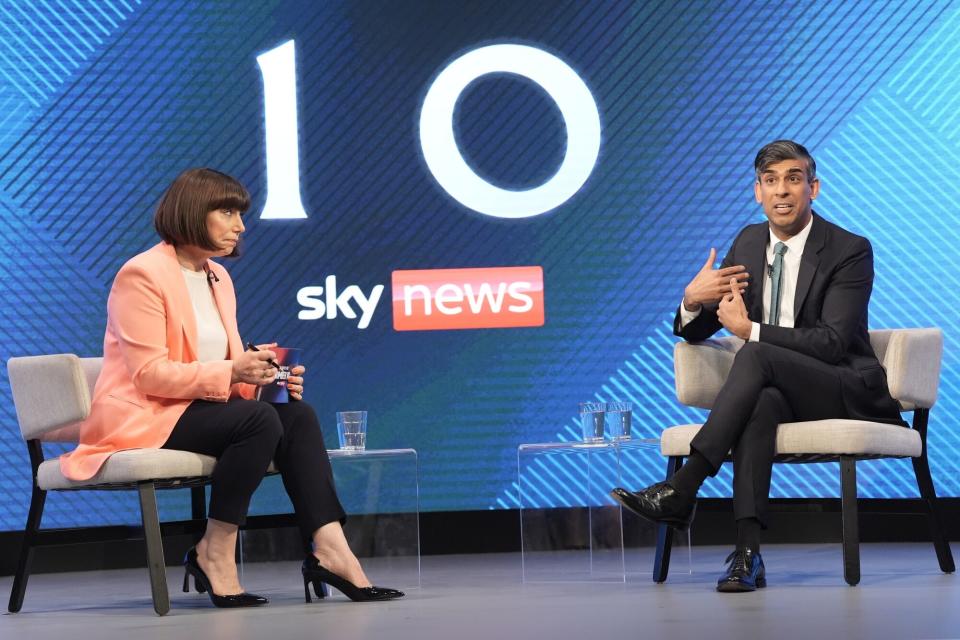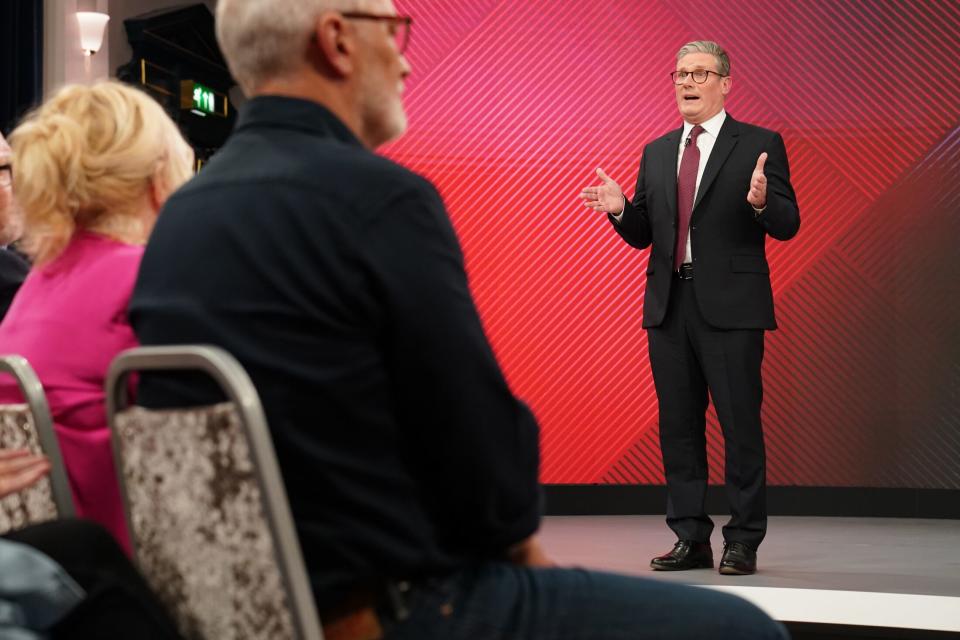Starmer Vows Labour Focus on Wealth Creation to Blunt Tories
(Bloomberg) -- Keir Starmer said he will put economic growth and wealth creation at the heart of Labour’s manifesto, as his poll-leading opposition party seeks to blunt Conservative attacks about tax before the UK election on July 4.
Most Read from Bloomberg
Wells Fargo Fires Over a Dozen for ‘Simulation of Keyboard Activity’
Apple to ‘Pay’ OpenAI for ChatGPT Through Distribution, Not Cash
Hunter Biden Was Convicted. His Dad’s Reaction Was Remarkable.
US Producer Prices Surprise With Biggest Decline Since October
Gavin Newsom Wants to Curb a Labor Law That Cost Businesses $10 Billion
“What we need to do is get the economy going — there’s a reason that taxes have gone up so much in recent years and that’s because the economy is flatlining,” Starmer said in a Sky News event in Grimsby. He said there would be “no surprises” in his party’s manifesto when it’s published on Thursday. “Working people shouldn’t pay more tax. We will not raise their tax.”
With a poll lead of over 20 points, Labour is on track to oust Rishi Sunak’s Tories and take power for the first time in 14 years next month. But the Conservatives are not giving in quietly, and are trying to turn the campaign into a fight over tax by accusing Labour of planning a re-distributive agenda.
That makes Labour’s manifesto publication a key moment — and perhaps even the last potential stumbling block — on Starmer’s path to 10 Downing Street. Labour looks set to reiterate key pledges including a cap on corporation tax at the current rate of 25%, and a commitment not to increase income tax, national insurance or VAT. Other headline policies include a state-run clean energy company, reforming planning rules and a pledge to build 1.5 million homes.
Starmer and Rachel Reeves, who would become Britain’s first female Chancellor of the Exchequer if Labour wins, have repeatedly said the party has “no plans” to raise taxes beyond those they already announced. They include charging VAT on private school fees, abolishing the special tax status for so-called non-doms in the UK, and extending the current windfall tax on oil and gas companies.
The pair have built a strategy around winning back trust on the economy and persuading businesses that the party has changed since the years under Starmer’s predecessor, the socialist Jeremy Corbyn, who guided Labour to a historic election defeat in 2019.
Other policies expected to be in the Labour manifesto include:
A new national wealth fund
Devolution to give mayors new powers on transport, housing, planning
Workers’ rights reforms
300 new nurseries and 1,000 new childcare places
Industrial strategy including for AI, to build data centers and infrastructure
That position has led to criticism, especially from the Labour left, that Starmer is not promising more aggressive revenue-raising to allow more spending on welfare and the National Health Service. On Wednesday, he said again he only would commit to pledges he can show the government will be able to afford.
“The easiest thing in the world is what Rishi Sunak is doing — it’s to simply say you can have everything, unfunded commitments, unfunded promises, that’s what got us into this problem in the first place,” Starmer said.
Yet perhaps his most awkward question in the Sky News event — in which Starmer and Sunak took turns to be interviewed and answer audience questions — came when presenter Beth Rigby asked the Labour leader about his campaigning to make Corbyn prime minister at the 2019 election.
“I did campaign for Labour, of course I did,” he replied, an answer that is unlikely to stop the question coming up again in this campaign.
Still, a snap YouGov survey of viewers gave Starmer a comfortable 64-36 win over Sunak on the night. The premier endured a torrent of criticism from the audience over the Tories’ record in office.
Sunak struggled to answer questions on why net migration is so high and NHS waiting lists so long — he was booed by the audience when he tried to blame striking doctors for the latter — as well as on his failure to enact his flagship policy to deport asylum seekers to Rwanda. He did say the first flight to Rwanda would take off on July 24, if the Tories are re-elected.
“We’ve got a clear plan for the future to make a difference to people — to cut their taxes, bring down immigration, to protect pensions,” Sunak said.
Perhaps the key moment for Sunak, though, was when he was unable to counter analysis by economists that the tax burden would rise under his Conservative Party’s plans — even as he insisted taxes would fall for the average worker.
It underscored how Sunak’s preferred attack line on Labour and taxes increasingly appears to be falling flat.
In the Conservative manifesto this week, Sunak promised five different tax cuts — including another two percentage points off the national insurance payroll tax — in a bid to woo voters. But his argument is a difficult one, after his government raised the tax burden on Britons to a seven-decade high.
“The Tories are in no position to be lecturing anyone on taxes,” Starmer said about the Tory attacks on his manifesto. “If you leave your country in a worse state than when you came into government, you should be booted out.”
In fact, there’s a strong argument that both parties are getting it wrong on tax. Polls show voters want public services repaired, even if they are also concerned about a historic squeeze on living standards. A recent survey by polling firm More in Common also found Britons see about the same risk of a Labour government raising taxes as a Conservative one.
So close to the finish line, though, Starmer is unlikely to shift course now. Many in Labour still refer back to the 1992 election, when the party led in the polls but was undermined by Tory claims then about a Labour “tax bombshell.”
“I’m not wanting to raise tax, I think people are taxed enough already,” Starmer insisted, though he declined to categorically rule out changes to levies paid on dividends, capital gains or council tax. He also said was “not looking at” wealth taxes. “Our manifesto is a manifesto for growth,” he said.
(Updates with comment from Starmer in eighth paragraph, Sunak in 13th.)
Most Read from Bloomberg Businessweek
Israeli Scientists Are Shunned by Universities Over the Gaza War
The World’s Most Online Male Gymnast Prepares for the Paris Olympics
Grieving Families Blame Panera’s Charged Lemonade for Leaving a Deadly Legacy
China’s Economic Powerhouse Is Feeling the Brunt of Its Slowdown
©2024 Bloomberg L.P.

 Yahoo News
Yahoo News 




